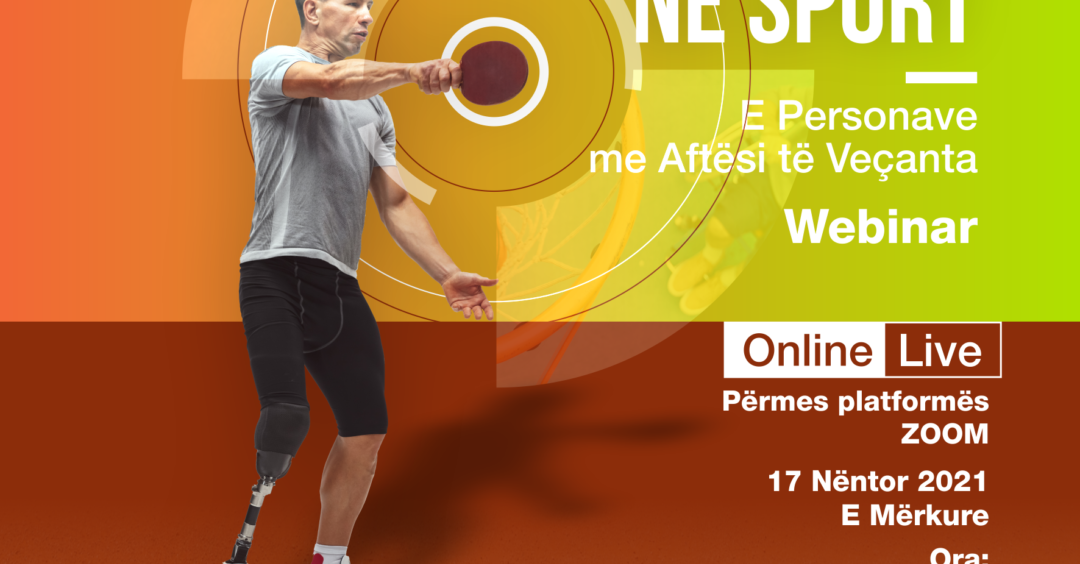Empowering Diversity: Advancing Inclusion in Sports for Persons with Disabilities
With the generous support of the Municipality of Prishtina, the Webinar – Inclusion in Sports of Persons with Disabilities convened a panel of experts to explore strategies for creating a more inclusive sports sector that actively involves individuals with disabilities. Drawing inspiration from successful models in leading nations worldwide, the webinar aimed to identify actionable steps for municipal sports authorities to foster greater participation and accessibility for individuals with disabilities in sports activities.
Across the globe, cities renowned for their progressive approaches to inclusion have prioritized the organization of sports activities for people with special needs within municipal frameworks. These initiatives not only ensure high levels of engagement among individuals with disabilities but also provide essential resources and facilities to support their participation. Following the lead of municipalities like Prishtina, Kosovo’s local authorities are urged to dismantle barriers to inclusion and invest in the infrastructure necessary to accommodate individuals with disabilities in sports.
The webinar convened a diverse array of experts and professionals, each contributing their unique insights and experiences to the discussion. Through their collective expertise, participants explored the critical steps required to integrate individuals with disabilities into society through sports, shedding light on best practices and success stories from around the world.
Central to the discussion was the exploration of inclusion in sports through institutionalized activities spearheaded by the Directorate of Sports of the Municipality of Prishtina, coupled with the provision of specialized sports equipment in public facilities. Panelists underscored the transformative impact of inclusion on both individual well-being and societal cohesion, emphasizing the multifaceted benefits of participation in sports for persons with disabilities. Drawing on their firsthand experiences and expertise, they highlighted the importance of proactive measures and concrete actions in realizing meaningful change at the grassroots level.
Moreover, the webinar served as a platform to highlight the indispensable role of collaboration and partnership in advancing inclusion efforts. Recognizing that no single entity can address the complex challenges of inclusion in isolation, participants emphasized the need for cross-sectoral collaboration between municipal authorities, sports organizations, disability advocacy groups, and community stakeholders. By leveraging collective resources, expertise, and networks, stakeholders can pool their efforts to create a more supportive and inclusive environment for persons with disabilities in sports.
In addition to promoting physical inclusion, the webinar also underscored the importance of fostering a culture of acceptance and respect within the sports community. Participants emphasized the need for education and awareness initiatives aimed at challenging stereotypes, dispelling myths, and promoting positive attitudes towards disability. By promoting a culture of inclusivity and empathy, sports organizations can create a welcoming environment where individuals of all abilities feel valued, respected, and empowered to participate.
Looking ahead, participants expressed a collective commitment to translating the insights and recommendations generated during the webinar into tangible action. From implementing accessibility measures in sports facilities to developing inclusive programming and training initiatives, stakeholders pledged to take concrete steps towards advancing inclusion in sports for persons with disabilities. By harnessing the momentum generated by the webinar, they aim to catalyze a movement for change that reverberates across municipalities and communities, fostering greater opportunities for participation and empowerment.
As the webinar concluded, participants emerged with a renewed sense of purpose and determination to drive progress towards a more inclusive sports sector. Armed with actionable insights and a shared commitment to collaboration, they stand poised to champion the rights and dignity of individuals with disabilities, ensuring that sports remains a platform for unity, diversity, and empowerment for all.


